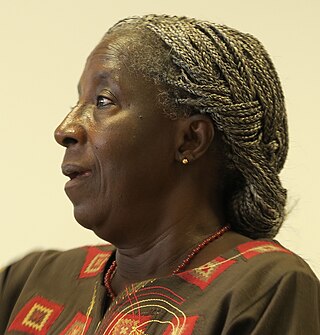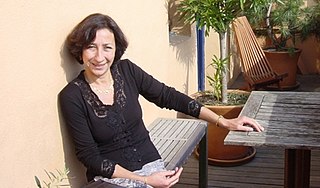Related Research Articles

Georges Balandier was a French sociologist, anthropologist and ethnologist noted for his research in Sub-Saharan Africa. Balandier was born in Aillevillers-et-Lyaumont. He was a professor at the Sorbonne, and is a member of the Center for African Studies, a research center of the École pratique des hautes études. He held for many years the Editorship of Cahiers Internationaux de Sociologie and edited the series Sociologie d'Aujourd'hui at Presses Universitaires de France. He was elected to the American Philosophical Society in 1976. He died on 5 October 2016 at the age of 95.

Michel Maffesoli is a French sociologist.
Danièle Hervieu-Léger is a French sociologist specialized in the sociology of religion.
François Dupuy was a French management scholar, educator, and consultant, specializing in the sociology of business organizations. In 2015 he served as an adjunct professor at INSEAD and as academic director at CEDEP, the European Centre for Executive Development. He is the author of numerous books on management in both French and English. He was also a co-founder and partner of Mesa Research Group, a consulting firm specializing in leadership development.
Cairn.info is a French-language web portal, founded in 2005, containing scholarly materials in the humanities and social sciences and recently scientific, technical, and medical sciences. Much of the collection is in French, but it also includes an English-language international interface to facilitate use by non-francophones. Primary research areas include communications, economics, education, geography, history, literature, linguistics, philosophy, political science, law, psychology, sociology, and cultural studies. The site provides gratis open access to some publications.

Danièle Bourcier is a French lawyer and essayist, who has contributed to the emergence of a new discipline in France: Law, Computing and linguistics.
Danièle Kergoat is a French academic and feminist sociologist. Her research focuses on gender and social relations of sex, work, social movements, the power to act.

Fatou Sow is a Senegalese feminist sociologist specialising in sociology of gender.

Véronique Cortier is a French mathematician and computer scientist specializing in cryptography. Her research has applied mathematical logic in the formal verification of cryptographic protocols, and has included the development of secure electronic voting systems. She has also contributed to the public dissemination of knowledge about cryptography through a sequence of posts on the binaire blog of Le Monde. She is a director of research with CNRS, associated with the Laboratoire Lorrain de Recherche en Informatique et ses Applications (LORIA) at the University of Lorraine in Nancy.
Marie-Anne Cohendet is a French political scientist and expert in constitutional law. She is a professor in the faculty of public law at the University of Paris 1 Pantheon-Sorbonne. Cohendet studies the constitutional and institutional structure of French politics, and she has also written on potential democratic reforms to the French political system.
Catherine Louveau is a French sociologist and academic. She is president of the Institut Émilie-du-Châtelet.

Elsa Dorlin is a French philosopher and professor in the department of political science at University of Paris 8 Vincennes/St. Dénis.

Marie-Cécile Naves is a French sociologist and political scientist who is the director of research at Institut de relations internationales et stratégiques (IRIS). A specialist in the United States, she also speaks on the themes of sports and gender.

Margaret Rose Maruani Rey was a Tunisian-born French sociologist and director of research at the French National Centre for Scientific Research (CNRS) in Paris. She was the founder and editor-in-chief of the academic journal, Travail, Genre et Sociétés and directed the international and multidisciplinary research network "Marché du travail et Genre" (MAGE–CNRS).

Delphine Gardey is a French historian and sociologist. She is a professor of contemporary history at the University of Geneva, Switzerland, and director of the Institute of Gender Studies at the Faculty of Social Sciences. She is currently a member of the editorial board of the journal Travail, Genre et Sociétés. She is also affiliated with "Groupement De Recherche Européen" (GDRE) and "Marché du travail et genre en Europe" (MAGE). She is a member of the "Genre, Travail, Mobilités" (GTM) Laboratory of "Centre de recherches sociologiques et politiques de Paris" (CRESPPA). Her work focuses mainly on the history of science and technology studies, feminist theories, as well as the place of women in history and society in general.
Catherine Marry is a French sociologist. Her research concerns the sociology of education, the sociology of work and gender studies. She was awarded an Irène Joliot-Curie Prize in 2008 for her mentorship activities and is a research director emeritus at the French research center, CNRS.
Anne Peyroche, born Anne Marthe Alice Smal, is a French biologist and geneticist. From October 2017 to January 2018, she acted as interim president of the National Center for Scientific Research (CNRS) until fraud allegations were made.
The Institut des mondes africains (IMAF) is a French academic mixed and interdisciplinary research unit for African studies, in which the national research organisation CNRS, three other French national academic research institutions and two universities collaborate. They are the Institut de recherche pour le développement, the École pratique des hautes études (EPHE), the École des hautes études en sciences sociales and the Aix-Marseille University and the Pantheon-Sorbonne University.

Marie-Françoise André, born 21 November 1953 in Paris, is a French geographer and geomorphologist specialising in the study of landscape architecture in the polar regions. She applies her knowledge of stone erosion in the field of heritage preservation, particularly in Angkor. Her research was awarded the silver medal from CNRS, the French national centre for scientific research.

Gisèle Sapiro is a French sociologist and historian whose specialty area is 19th and 20th century French literature. She is a laureate of the CNRS Silver Medal (2021) and the CNRS Bronze Medal (2000).
References
- 1 2 "CRESPPA - UMR 7217 - Devreux Anne-Marie". www.cresppa.cnrs.fr (in French). Retrieved 2018-11-04.
- 1 2 Ordre national de la Légion d'honneur, page 12/28, published 1 January 2017 on the site of the Legion of Honour (accessed 3 April 2018)
- ↑ Topalov, Christian (1992). "Centre de recherche. Le Centre de sociologie urbaine (CSU)". Politix (in French). 5 (20): 195–201.
- ↑ "Site web du CRESPPA" (in French).
- ↑ "CRESPPA - UMR 7217 - Devreux Anne-Marie". www.cresppa.cnrs.fr (in French). Retrieved 2018-11-06.
- ↑ Mengotti, Marie (2017). "Les sciences et le genre. Déjouer l'androcentrisme ed. by Anne-Marie Devreux (review)". Population, English Edition. 72 (4): 723–724. ISSN 1958-9190 . Retrieved 2018-11-08.
- ↑ "Les sciences du vivant ont besoin du genre". CNRS Le journal (in French). Retrieved 2018-11-04.
- ↑ "CIRFF2018" (in French). Retrieved 9 March 2018.
- ↑ awathiam7 (30 August 2018). "AUX ORGANISATRICES DU "CIRFF2018"". Club de Mediapart (in French). Retrieved 2018-11-04.
{{cite journal}}: CS1 maint: numeric names: authors list (link) - ↑ "Pourquoi la sociologie n'a pas (encore ?) fait sa révolution féministe". Association des sociologues enseignant-e-s du supérieur (in French). 15 June 2017. Retrieved 3 April 2018.
- ↑ Marie Mengotti (2018). "Devreux Anne-Marie (dir.), 2016, Les sciences et le genre. Déjouer l'androcentrisme, Rennes, PUR, Essais, 292 p." Population. 72 (4): 755–756. doi:10.3917/popu.1704.0755.
- ↑ Mathieu Trachman (2 February 2011). "Les sciences sociales ont-elles un sexe ?". La Vie des idées (in French).
- ↑ Anne-Marie Devreux, « La critique féministe et La domination masculine Archived 2013-05-09 at the Wayback Machine », published on the website Mouvements. Des idées et des luttes (accessed 3 April 2018)
- ↑ La-Croix.com (2014-05-05). "La recherche doit mieux prendre en compte les différences entre les sexes". La Croix (in French). Retrieved 2018-11-04.
- ↑ Artemisa Flores-Espínola (15 June 2017). "Pourquoi la sociologie n'a pas (encore ?) fait sa révolution féministe | Ases". sociologuesdusuperieur.org (in French). Retrieved 2018-09-07.
- ↑ Jean-Louis Jeannelle (21 October 2010). ""Sous les sciences sociales, le genre" et "De la différence des sexes : le genre en histoire"". Le Monde.fr (in French). Retrieved 2018-11-04.
- ↑ Marion Rousset (19 May 2018). "L'homme enfin inclus dans les études de genre". Le Monde.fr (in French). Retrieved 2018-09-07.
- ↑ "Charge mentale: à l'école aussi". Slate.fr (in French). 2017-09-04. Retrieved 2018-11-04.
- ↑ "Au nom du bien-être de l'enfant". Le Monde diplomatique (in French). 2011-05-01. Retrieved 2018-11-04.
- ↑ Anne-Marie Devreux (2004). "Autorité parentale et parentalité. Droits des pères et obligations des mères ?". Dialogue. 165 (3).
- ↑ Anne-Marie Devreux et t Diane Lamoureux. (2012). "Les antiféminismes : une nébuleuse aux manifestations tangibles". Cahiers du Genre. 52 (1): 7–22.
- ↑ Jean-Louis Jeannelle (21 October 2010). ""Sous les sciences sociales, le genre" et "De la différence des sexes : le genre en histoire"". Le Monde (in French). Retrieved 2018-11-04.